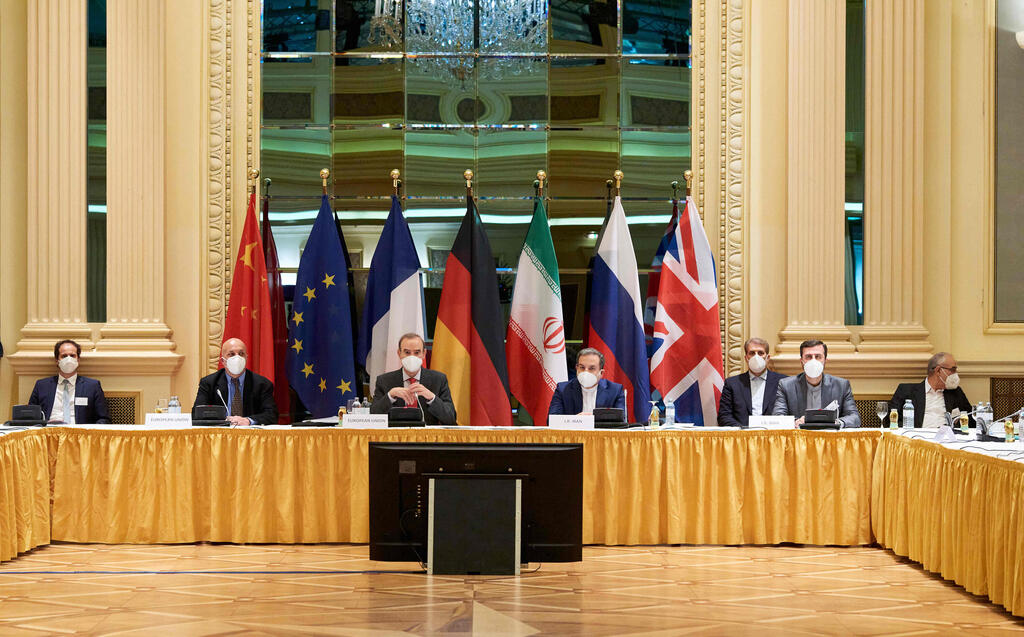Getting your Trinity Audio player ready...
Israel's Permanent Representative to the United Nations and Ambassador to the United States Gilad Erdan said on Thursday he estimated that the ongoing negotiations between the U.S. and Iran to revive the 2015 nuclear agreement will lead to both parties striking a new deal within weeks.
"I say it with grief, the Americans presented before us the difficulties in the negotiations with Iran, but still, the estimates in Israel are that the sides will reach an understanding in the coming weeks," Erdan said in an interview with the Ynet studio. "There may be some disagreements on how many sanctions [the U.S.] will remove and how [Iran] will return to abide by the agreement, but the Iranians have recognized that there is an overall desire to return to the old nuclear deal signed at the time of [former U.S. President Barack] Obama. We believe that returning to this bad agreement is a mistake, even a significant one."
2 View gallery


Diplomats of the EU, China, Russia and Iran at the start of talks on a U.S. return to the 2015 nuclear deal, at the Grand Hotel in Vienna
(Photo: AFP)
Tehran and Washington, as well as other signatories to the accord, have been meeting in Vienna over the past several weeks to try and work out a return of both parties to full compliance with the agreement.
Former U.S. President Donald Trump withdrew from the nuclear deal in 2018. His administration then imposed sanctions on the Islamic Republic in what he called a "maximum pressure" campaign to coerce Tehran to agree to substantial changes to the agreement.
Iran, on its end, has been gradually breaching the agreement's clauses and even announced earlier in the month it had started enriching uranium up to 60% following a blast in its nuclear facility in Natanz, which Tehran attributes to Israel.
Erdan met with U.S. National Security Advisor Jake Sullivan on Wednesday and told him that Israel was not interested in lending a hand to "a flawed agreement that gives legitimacy to an extremist state ruled by fanatics to hold thousands of advanced centrifuges" and voiced his concerns that the agreement will significantly cut the time the Islamic Republic needs to obtain nuclear arms.
2 View gallery


L-R: Israeli UN and U.S. envoy Gilad Erdan, U.S. National Security Advisor Jake Sullivan and Israeli counterpart Meir Ben-Shabbat
(Photo: Israeli Embassy in Washington)
Erdan, alongside National Security Advisor Meir Ben-Shabbat, stressed that Jerusalem was still interested in expanding its cooperation with Washington in other fields despite the disagreements between the countries on the Iranian issue.
The 50-year-old, who had previously served as a member of Knesset on behalf of Prime Minister Benjamin Netanyahu's Likud party and held multiple ministerial positions, also said that Israel was not giving up on its fight against Iran's nuclear aspirations and that the Jewish state "reserves freedom of action" against the agreement that "poses a tangible future risk to Israel's existence."
The Israeli envoy also claimed the U.S. believes a return to the agreement would able it to form an international coalition that will pressure Iran to reach a longer deal with tighter oversight mechanisms on Tehran's nuclear facilities. Israel, on the other hand, is of the opinion that "once the international community loses the sanctions and returns to the agreement, the Iranians will not agree to discuss a better future agreement that is actually bad for them, compared to the existing agreement."

